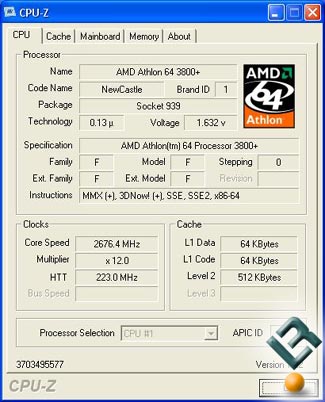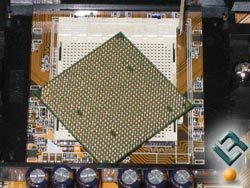Socket 939 Processor’s Arrive!!
Overclocking:
From our expierence the “pre-release” sample we get for testing are usually the first processors off the line and don’t over clock too well. In this situation the motherboard we are using (the ASUS A8V) still had some pre-production issues being worked out. By this I mean the BIOS wasn’t yet perfected and an example of this was the many BIOS’s i went though the week before the Socket 939 launch! The overclocking was done a couple weeks ago on BIOS version 1003, while our testing was done on version 1005. Time constraints kept us from using the latest version for overclocking.
|
|
|
At default voltages (1.50V) the 3800+ could easily overclock up to 219MHz FSB before the system would become unstable under heavy loads. After cranking the voltage up a bit to 1.65V we were able to hit 223MHz FSB before we started having issues with the video card. After some investigation it was determined that the AGP Bus was not locked on the board. The Via K8T800 Pro chipset supports a locked AGP/PCI Bus, but our BIOS lacked support for it and it wasn’t not enabled by default.
|
K8T800 Pro @ 74MHz (QDR) |
When we fired up Everest v1.1 to monitor what our system was doing we quickly found that the chipset was running at 74MHz when we were overclocked to 223MHz FSB. With this found out our overclocking came to a quick end. It’s pointless to drop the multiplier since the AGP bus will be running unlocked & we’d encounter the same problem above 223MHz FSB. (of course we still tried)
All in all we were able to overclock the AMD A64 3800+ Socket 939 processor 276MHz over default on a platform that has not yet matured! While this is not spectacular it’s nothing to complain about! Once we have a matured BIOS or another board that has a locked PCI Bus we will have to give the 3800+ another chance and maybe give it some watercooling!
Conclusion:
|
|
|
Nathan Kirsch’s Thoughts:
The Socket 939 processor bring to the table the true NewCastle core as well as dual channel memory for the main stream AMD Athlon 64 processors. This is something enthusiasts have been asking for since the single channel 754-pin platforms first came out many months ago. While the advantages of dual channel memory is minimal the new core should allow more head room for AMD to ramp up the frequencies. On another bright note the socket 939 platform is that we have seen it slated on the road maps into 2006! Therefore you shouldn’t have to worry about your socket choice becoming obsolete within 6-12 months. Think of the Socket 939 being the replacement for Socket 462, which has been around since 2000 and still has new chipsets hitting the market for it more than four years later.
There are many AMD enthusiasts running Barton 2500+’s that have skipped the Socket 754 and Socket 940 CPU’s due to projected life span of the sockets and have been waited on the Socket 939 platforms. For those of you that fit this category you might be more interested in the “budget” priced 3500+ processor ($500). There is large jump in performance over your old Barton core and you will also be gaining 64 bit technology. When the AMD Athlon 64’s first came out support was limited, but in recent times we have seen more 64 bit drivers hit the market, which makes it a feature that separates AMD from Intel and many consumers are interested in.
AMD Socket 939 1KU (in 1,000-unit quantities) Pricing:
- AMD Athlon 64 FX-53 processor $799 each
- AMD Athlon 64 3800+ processor $720 each
- AMD Athlon 64 3700+ processor $710 each
- AMD Athlon 64 3500+ processor $500 each
As far as pricing is concerned AMD has priced the processors at what we would consider relatively high prices. ($500 for the 3500+ and $720 for the 3800+) While the prices on the latest and greatest CPU’s is always high this was honestly a bit higher than we first thought. Part of this goes back to AMD’s one and only FAB for all their processors. Since they only have one location to produce processors they are cranking out several socket types the manufacturing costs must be higher than Intel’s entire Socket 478 design. On a bright note the NewCastle core is smaller than the Clawhammer and eventually we should see pricing lower once these processors begin to ramp up. It is also likely that AMD will introduce socket 939 processors rated lower than 3500+, just like AMD did when they launched the 2800+ and 3000+ socket 754 processors after the initial launch of that platform.
Overall the Socket 939 platform seems to be a great upgrade for those who have been holding for it and are running on an older platform. If you are currently running a Socket 754 processor there is less than a 5% gain on the new socket, so save up your money for an upgrade of a different sort!
For those of you who are holding off to see what numbers the upcoming Alderwood and Grantsdale are offering you wont have to wait too much longer. But keep in mind that while the Alderwood boards are offering PCI Express, DDR2 memory, integrated WIFI these hardware changes that are going to make for some large expenses that may be hard to explain to your other half! Hey, we’d rather have you here reading our articles rather than in divorce court!
Legit Bottom Line:
The AMD Socket 939 platform has finally arrived & the performance of the AMD Athlon 64 3800+ is greater than that of the majority of the leading mainstream and enthusiast Intel processors.






Comments are closed.